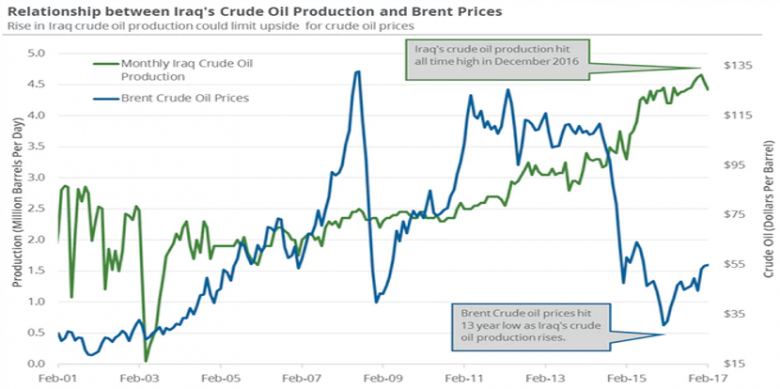
OPEC COOPERATION

PLATTS - Saudi oil minister Khalid al-Falih visited Baghdad on Saturday, calling for increased cooperation between OPEC's two largest oil producers as the group prepares to debate on extending its production cut deal next month.
"The best example of the importance of cooperation between our two countries is the improvement and stability trend seen in the oil market," Falih told delegates at the Baghdad International Exhibition, according to media reports.
Falih's comment came despite Iraqi compliance with its quota -- under the production cut deal -- being among the weakest of the OPEC members, with production averaging 4.50 million b/d in September.
That is 149,000 b/d above its output quota.
Compliance among OPEC and major non-OPEC producers reached 120% in September, its highest level since the output constraint deal was launched in January, the Joint Ministerial Monitoring Committee said Saturday.
The JMMC, however, noted that while some of the participating producer countries have consistently performed beyond their voluntary cuts, others have yet to achieve 100% conformity. It did not provide any details identifying the underperformers.
Falih was the first Saudi official to speak publicly in the country since Iraq's invasion of neighboring Kuwait in 1990, when diplomatic relations were severed and borders closed.
Riyadh also viewed Baghdad with suspicion in the years that followed, both under the regime of Saddam Hussain, and the Shia-dominated post-war governments after 2003. It only reappointed an ambassador to Iraq in 2015, and even then relations have been frustrated.
However, there have been positive signs recently.
THAWING RELATIONS
Saudi foreign minister Adel al-Jubeir visited Baghdad in February and Saudi Arabia agreed to finally open the Arar border crossing in August, for the first time since 1990.
Shortly after Falih's speech, Iraq's Prime Minister Haider al-Abadi traveled in the other direction to Riyadh, his second trip this year, where he will meet with Saudi officials in an attempt to rebuild relations and to attract investment in Iraq's reconstruction efforts. The rapprochement has been promoted by the US, and US Secretary of State Rex Tillerson took part in the Riyadh meetings as well.
Falih said a joint committee had been established to work on economic partnerships and reactivating cooperation. He did not provide any further details, but it could include the possibility of restarting crude oil exports by pipeline through Saudi Arabia. Before the invasion of Kuwait, Iraq used a 1.6 million b/d pipeline to the Al-Muajjiz terminal on the Red Sea, as an alternative to sending cargoes through the Strait of Hormuz.
Reactivating this would not be simple. The pipeline was confiscated by the Saudi government in 2000, and Iraq also has other oil export plans, which would take priority. Baghdad has spent the last five years trying to develop an alternative export route, first through Syria to the Mediterranean and then through Jordan to the Red Sea. It is also trying to boost exports from the north of the country to Turkey's Ceyhan port and possibly through Iran too.
Iraq's crude exports, including shipments from the semi-autonomous Kurdistan region, totaled 3.815 million b/d in September. Federal exports from the southern terminals on the Persian Gulf accounted for the majority of this, at 3.240 million b/d.
Thamir Ghadban, a former oil minister who now advises the prime minister on energy affairs, previously said Iraq would never again build and pay for a pipeline that another country can seize.
-----
Earlier:

2017, September, 29, 12:15:00
TURKEY NEED IRAQI OILThe government of Turkey said it will deal exclusively with the Iraqi government on oil exports after voters in the semiautonomous Kurdistan Region of Iraq supported independence in a controversial referendum.
|

2017, September, 22, 08:50:00
RUSSIA - KURDISTAN INVESTMENTInstead, with the planned referendum just days away, Russian state oil giant Rosneft announced its latest investment last week, to help Iraqi Kurdistan develop its natural gas industry, for domestic supplies and eventual export.
|

2016, November, 21, 19:00:00
IRAQ'S THREE PROPOSALSThe Organization of the Petroleum Exporting Countries agreed in September to reduce output to help draw down a global supply glut that is weighing on oil prices, but left the details of the plan to be worked out later. The group is holding a so-called “technical meeting” at their Vienna headquarters Monday and Tuesday to discuss the mechanism for implementing the September agreement. The technical meeting will prepare for OPEC’s ministerial meeting Nov. 30 in Vienna. |

2016, January, 17, 15:25:00
IRAQ OIL: 3.3 MBDIraq's exports from its southern region have been running at an average daily rate of 3.297 million barrels per day (bpd) so far this month, higher than December's average and unaffected by tribal clashes, an oil company executive said on Saturday.
|

2015, April, 4, 13:15:00
IRAQ OIL RISE 15%Iraq boosted crude shipments in March to the highest level in more than three decades, adding to a global supply glut that has helped push down oil prices by 46% in the last year.
|

2014, December, 27, 19:25:00
IRAQ OIL PRICE 2015: $60 /BBLOPEC will need to “step in” amid further declines in oil prices, which are fair at about $70 to $80 a barrel, according to the group’s second-biggest producer.
|

2014, June, 13, 21:25:00
IEA: IRAQI OIL ISN'T RISKIEA Says Iraqi Oil Isn't at Immediate Risk |





